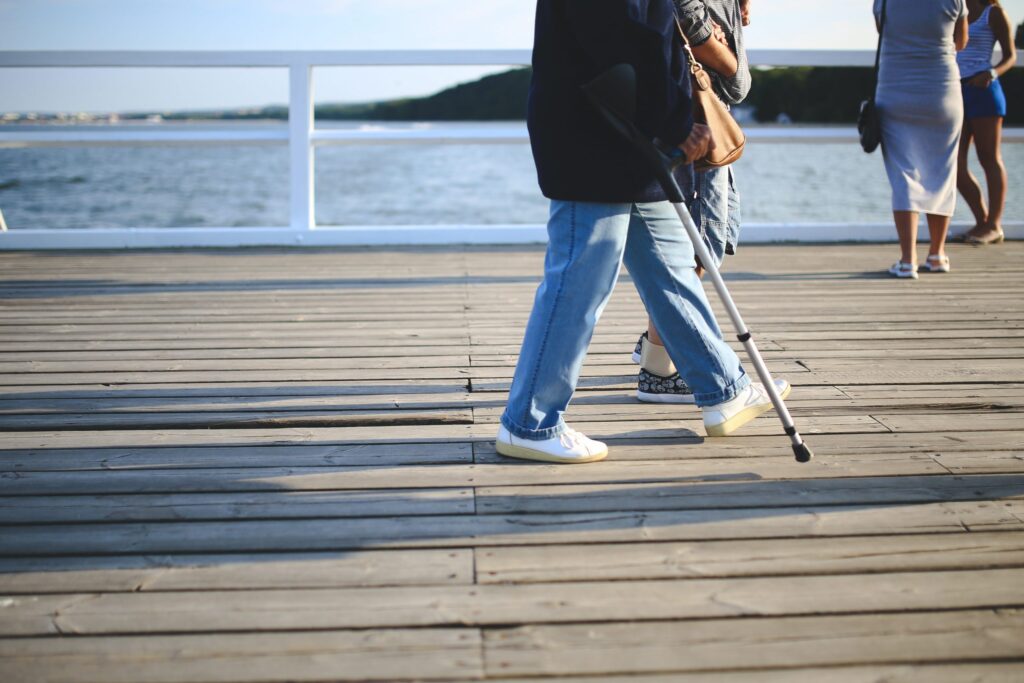Any sort of injury can be a frustrating and demoralizing feeling. Aside from the physical pain, there is the mental strain of knowing that the bills are piling up while you are incapacitated, and you can’t do anything but wait. Knowing that someone else’s negligence caused your injury and, therefore, could have been avoided entirely is all the more frustrating.
Each year, nearly 150,000 people nationwide die from injuries, most of which occur through preventable accidents at home, while playing or on the road. Injuries are the leading cause of deaths and lifelong disabilities among people 44 and younger in Louisiana and in the United States.

Common Personal Injury Claims Filed in Baton Rouge
Personal injury cases occur when an individual, corporation, or other entity is negligent, and that negligence causes harm.
- Motor vehicle accidents including; cars, buses, commercial trucks, motorcycles, and rideshare services such as taxis, Lyft, and Uber.
- Bicycle accidents
- Pedestrian accidents
- Premises liability – including dog bites, slip-and-fall accidents, and construction site accidents.
- Product liability
- Medical malpractice – including birth injuries
- Public liability
- Abuse – including sexual abuse, elder abuse, and nursing home abuse
- Workplace injuries
Most Common Resultant Injuries
This is by no means a complete list of injuries that have resulted in a personal injury case. Any injury caused by the negligence of another person or party is worthy of acknowledgment and compensation. Below are merely some of the most common:
- Whiplash, especially in motor vehicle accidents
- Traumatic brain injuries
- Broken bones
- Soft tissue injuries
- Internal bleeding
- Organ damage
- Amputation or limb loss
- Disfigurement and scarring
- Burns
- Nerve damage
If you are still determining whether your injury is worth filing a claim for, it would be wise to speak to an attorney. If you are considering filing a claim already, the answer is yes.
What is Negligence?
Negligence is a legal term describing a person or party’s failure to behave appropriately and responsibly that someone with average prudence would have used in the same situation.
Negligence can be broken down into four parts: duty of care, breach of duty of care, causation, and damages. To have a personal injury case, negligence must be proven.
Duty of care is the idea that each person has a responsibility to themselves and their fellow human beings to behave with reasonable care and caution to keep themselves and those around them safe. For example, it would fall under a waiter’s duty of care to report to the kitchen staff if a table they are serving has a severe shellfish allergy.
Breaching duty of care happens when a person fails to behave with a reasonable level of care and caution. If the waiter knew of the patron’s shellfish allergy and didn’t note or report it to the kitchen staff, that would constitute a breach of duty of care.
Causation is the resultant harm caused by breaching the duty of care. If the person’s shellfish allergy was anaphylactic, and the kitchen staff, unaware, used a knife that had chopped shrimp to chop the broccoli for the allergic person’s dish, the allergic person would have a severe allergic reaction that could have been entirely avoided.
The aftermath of the negligence is called damages. In this case, the damages might be exorbitant hospital bills, or even wrongful death, depending on the severity of the allergy.
Types of Negligence in Personal Injury Cases
Three types of negligence commonly appear in personal injury cases. These are gross negligence, comparative negligence, and vicarious liability.
Gross negligence is the most serious. It is a highly reckless departure from reasonable care and caution. An example of gross negligence would be a pet sitter failing to feed or interact with their charges for multiple days,
Comparative negligence becomes applicable when multiple parties are found to be at fault. The percentage of fault by each party becomes essential, as someone found to be 15% at fault for an accident will face less severe consequences than someone found to be the remaining 85% at fault.
Vicarious liability is the most complex of the three. Vicarious liability would come into play if an underage child stole and crashed their parent’s vehicle, damaging a neighbor’s mailbox. Because the child is a minor, they cannot be held fully responsible for their actions, so it falls to the parents.
Gathering Evidence to Prove the Existence of Negligence
In personal injury cases, the burden of proof falls on the plaintiff. While your attorney can be infinitely helpful in gathering evidence to bolster your case, you can help streamline the process by thoroughly documenting your case to the best of your ability.
For example, you broke your ankle falling down stairs without a railing in your apartment. You had made your landlord aware of this issue upon moving in and had brought it up multiple times – first verbally, on move-in day, then over text message a month later, and finally via email after two months of inaction by your landlord.
In Louisiana, stairs must have at least one handrail extending eighteen inches beyond the top and bottom steps. Since your landlord has been made aware of the issue multiple times, they are responsible for your injury, as their negligence contributed to it.
First, the lack of railing. If you gather evidence for this situation, you could start by taking photographs. If you are comfortable, you could take photographs of your injury.
If anyone was home at the time of the incident, or if you have roommates aware of the issue during the situation, you should ask for their contact information and see if they are comfortable stating your attorney. Do not question them yourself.
Be sure to request copies of any documentation you receive at doctor’s visits. It would also be wise to go to regular checkups to have documentation from medical professionals about your injury, your healing process, and how your injury has impacted your life.
Using a binder to collect all relevant documentation organized by type or chronology would be wise. This will save you and your attorney time and help the claims process go more seamlessly and less painfully.
Compensation in Baton Rouge Personal Injury Claims
Damages are simply another word for the compensation you can recover for your losses. They fall into three categories: economic, non-economic, and punitive.
Economic Damages
Economic damages are any losses you’ve suffered due to your accident that have a direct monetary value attached. If the loss you experienced came with a receipt, bill, or invoice, it is probably economic damage. Examples of economic damages include:
- Medical bills
- Medication copays
- Physical therapy costs
- Emotional therapy costs
- Ambulance bills
- Cost of transportation to medical visits.
- Lost wages
- Lost future wages / lost earning capacity
- Other out-of-pocket expenses
Non-Economic Damages
Non-economic damages are more difficult to calculate as they are more conceptual and less concrete. However, they are still worth acknowledgment and compensation, as they take a toll on your life, whether or not they leave a paper trail. Examples of non-economic damages include:
- Physical pain and suffering
- Emotional distress
- Loss of enjoyment of life
- Diminished quality of life
- Loss of consortium
- Permanent disability
- Permanent disfigurement
Punitive Damages
Punitive damages are additional fines incurred by the guilty party to punish reckless or dangerously negligent behavior. Punitive damages are strictly regulated in Louisiana and are only awarded under particular circumstances. The most common cases that result in punitive damages are DUI-caused car accidents or sexual assault cases.
Why Seek an Attorney?
It can feel incredibly intimidating to realize that your personal injury is not something you can handle alone.
In a vulnerable state, having suffered unexpected losses, everything can seem overwhelming – and the idea of contacting an attorney may initially add to that feeling. However, an attorney is simply someone there to fight for you and take some of the things you are stressed about off your plate.
A lawyer must go through years of rigorous schooling to get their degree. Aside from the robust education this gives them, they also spend those years connecting with others, both in and out of the legal field. An attorney has many resources gathered over years of dedicated study and networking, and they want to use those resources to help you.
These resources include relationships with experts in fields relevant to your case, whom your attorney may call on to testify and strengthen your case. For example, if your personal injury resulted from medical malpractice, your attorney may call a doctor to the stand.
Your attorney can handle one of the most daunting aspects of a personal injury case: talking to your insurance company. Logically, your insurance company should be on your side. Unfortunately, that is not always the case. First and foremost, your insurance company has one goal: profit. Giving your claim’s true value is not profitable for your insurance company.
Your insurance adjuster will likely use manipulative tactics to get you to “slip up” and admit to fault. Any admission of fault, even an accidental “I’m sorry,” can devalue your claim. Your attorney will have years of experience handling insurance adjusters and be wise to all of their tricks.
They will be able to advocate for you and avoid pitfalls, ensuring you are offered the maximum value of your claim. They will also be able to use precedent to compare the value you’ve been offered.
Finding the Right Personal Injury Attorney for You in Baton Rouge
Contacting a Baton Rouge personal injury lawyer can feel like a big step. It can be scary to admit that it’s time to get help from a professional. Rozas Injury Law LLC understands, which is why we offer free case consultations. We answer your questions, set your mind at ease, and help you understand your options before you start down any.
If you have a personal injury due to the negligence of another person or party, don’t wait to call Rozas Injury Law LLC today at 225-343-0010 and schedule your free consultation. We’re here for you whenever you’re ready.
Rozas Injury Law – Baton Rouge Personal Injury Lawyer
Address: 9332 Bluebonnet Blvd, Baton Rouge, LA 70810, United States
Phone: (225) 401-3727
Citations
DHH Reminds Louisianians, “Safety is No Accident: Live Injury Free”
https://ldh.la.gov/index.cfm/communication/viewcampaign/198



